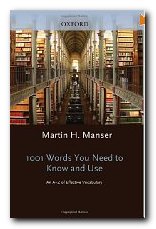1001 words you need to know and use
I’m often amazed at the number of verbally articulate people who freeze up the minute the need to express themselves in writing. They get a couple of words onto the page, and then seem to hit a blank wall. Alternatively, they might be asked to describe something they know perfectly well, and produce what looks like a note to the milkman. The unproven theory I offer to students to help them overcome this problem is that writing is like sport: you need to practice regularly to stay in shape. An A-Z of Effective Vocabulary is an antidote to this problem.
 You also need to have a vocabulary at your disposal that’s appropriate for the writing task at hand. That’s where this book is aiming to help. It’s a sort of specialist dictionary with extra supplements that act as guides for common writing tasks. The effective vocabulary items have been grouped for you in advance, according to your activity Here’s how it works.
You also need to have a vocabulary at your disposal that’s appropriate for the writing task at hand. That’s where this book is aiming to help. It’s a sort of specialist dictionary with extra supplements that act as guides for common writing tasks. The effective vocabulary items have been grouped for you in advance, according to your activity Here’s how it works.
You start from the point of having a common writing task. This could be any one of the following:
- writing a report
- drafting a business proposal
- expressing your opinion
- discussing a topic
- describing an event
- writing a CV and job application
First you consult the subject index, which lists the terms you might need according to your objective:
- Application letters
- Describing events
- Essays and term papers
- Evaluation reports
- Funding bids
- Interview techniques
and so on. Here you find listed a selection of vocabulary items which are likely to be effective. For instance, in the section for writing CVs, you are offered able, accomplish, accredited, accurate, achieve ,active, adapt and so on.
If you are writing a report, you will find a list of words you could use in your report, to help present your explanation or argument in a persuasive way. For example, you could choose accurate, compelling, enterprise or significant. By then turning to the main A-Z sequence you will find guidance on the meaning and use of these words.
This is, in one sense, the most important part of the book, where you are invited to learn the subtle shades of meaning which attach to words. You are also given examples of their use in different contexts to illustrate these distinctions.
objective adjective, noun
adjective not influenced by personal opinions or feelings, but considering only the facts: There’s little objective evidence to suggest that he is guilty • It’s hard for parents to be objective about their own children • noun something you are trying to achieve: What is the main objective of this project? • You must set realistic aims and objectives for yourself.
Usage objective, goal or target? See target. Usage The opposite of objective is subjective, ‘based on your own ideas or opinions rather than facts and therefore sometimes unfair’: a highly subjective point of view • Everyone’s opinion is bound to be subjective.
Word family objectively adverb Try to weigh up the issues as objectively as you can. objectivity noun: The survey’s claims to scientific objectivity are highly dubious.
Also included is a guide to pronunciation – which is particularly useful for words such as penchant which are of foreign origin. This is a curious book, but one which writers who need assurance might find helpful. It’s the latest addition to the popular mini-series that includes the Oxford A-Z of Grammar and Punctuation, the Oxford Guide to Plain English, and the Oxford A-Z of Better Spelling.
© Roy Johnson 2010
Martin H. Manser, An A-Z of Effective Vocabulary, Oxford: Oxford University Press, 2010, pp.166, ISBN: 0199560056
More on dictionaries
More on language
More on literary studies
More on writing skills
More on creative writing
More on grammar